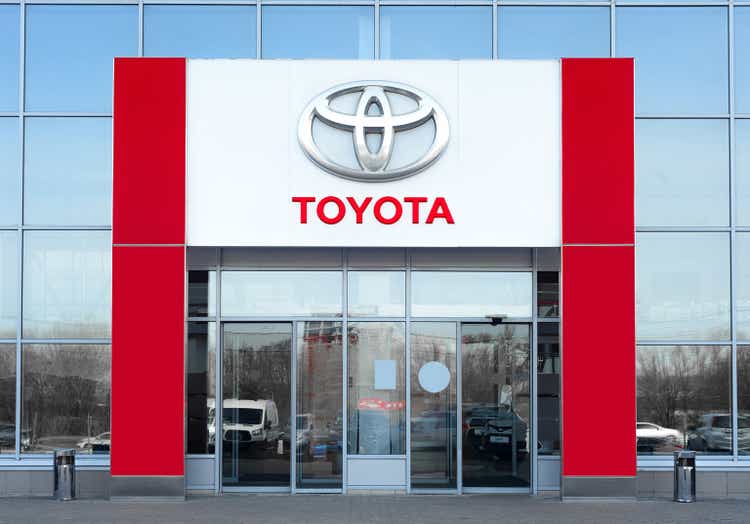Will Toyota Consolidate All U.S. Lexus Production at One Location?

Published: 2025-09-09 10:32:01 | Category: Trump GNEWS Search
Toyota Motor Corporation is taking strategic steps to enhance its operations in the United States by consolidating its Lexus production. This move comes in response to the rising tariffs imposed on imported vehicles, which have affected the company’s profit margins. By merging two existing Lexus manufacturing sites into a single, more efficient facility, Toyota aims to streamline its production processes and reduce costs, ultimately benefiting consumers and shareholders alike.
Last updated: 09 September 2025 (BST)
Key Takeaways
- Toyota plans to consolidate Lexus production in the U.S.
- This decision is a response to high U.S. tariffs on imported vehicles.
- The consolidation involves merging two existing manufacturing sites.
- The move aims to enhance efficiency and reduce operational costs.
- Potential benefits include improved profit margins and competitive pricing.
The Current Landscape for Toyota
Toyota Motor Corporation, headquartered in Toyota City, Japan, is one of the leading automotive manufacturers in the world. The company has been at the forefront of automotive innovation, producing a wide range of vehicles, including hybrids and electric models. However, recent global trade tensions, particularly between the U.S. and other countries, have led to increased tariffs that significantly impact manufacturers like Toyota.
Understanding Tariffs and Their Impact
Tariffs are taxes imposed on imported goods, which can lead to higher prices for consumers and reduced profit margins for companies. For Toyota, the tariff increases have made it more challenging to compete in the U.S. market, prompting the need for operational changes.
The Decision to Consolidate Lexus Production
According to reports from Nikkei, Toyota intends to merge two existing Lexus manufacturing sites in the U.S. into one centralised facility. This decision is expected to bring several advantages:
- Increased Efficiency: By combining operations, Toyota can streamline workflows, reduce redundancies, and improve overall production efficiency.
- Cost Reduction: Fewer operational sites mean lower overhead costs, which can ultimately lead to savings for consumers.
- Improved Quality Control: A single, consolidated site allows for better quality management and consistency in production.
What This Means for Lexus Customers
For Lexus customers, this consolidation can lead to several positive outcomes. Potentially, consumers may see improved vehicle quality and reliability as the company focuses its resources on a single production facility. Additionally, cost savings from operational efficiencies may translate into more competitive pricing for Lexus vehicles.
Future Implications for Toyota
This strategic decision to consolidate production is not just a reaction to current tariff challenges; it also reflects Toyota's long-term vision to adapt to a rapidly changing automotive landscape. As the industry shifts towards electric and hybrid vehicles, the company’s ability to remain agile and efficient will be crucial.
Global Competitive Landscape
In the broader context of the automotive industry, other manufacturers are also adapting to similar challenges. Companies like Ford and General Motors have faced their own obstacles related to tariffs and global supply chain disruptions. As such, Toyota's move could set a precedent for how other manufacturers approach production in the U.S.
Conclusion: Looking Ahead
As Toyota consolidates its Lexus production, the company positions itself for future success amidst evolving market conditions. By addressing the challenges posed by tariffs and focusing on operational efficiency, Toyota not only aims to protect its profit margins but also enhance customer satisfaction. As the automotive industry continues to evolve, it will be fascinating to see how Toyota and its competitors adapt.
In the coming years, the impact of these changes will likely shape the competitive landscape of the automotive market, influencing everything from pricing to technological advancements. How will other manufacturers respond to these challenges?
#Toyota #Lexus #AutomotiveIndustry
FAQs
What are the reasons behind Toyota's decision to consolidate Lexus production?
Toyota's decision to consolidate Lexus production is largely driven by the need to address high U.S. tariffs on imported vehicles, which have impacted profit margins. By merging two manufacturing sites into one, Toyota aims to improve efficiency and reduce costs.
How will this consolidation affect Lexus vehicle prices?
The consolidation is expected to lower operational costs, which may lead to more competitive pricing for Lexus vehicles. However, the exact impact on prices will depend on various market factors.
What are the benefits of consolidating manufacturing sites?
Consolidating manufacturing sites can lead to increased efficiency, reduced operational costs, and improved quality control. It allows companies to streamline operations and focus resources more effectively.
Will Toyota's consolidation affect its production capacity?
While consolidating sites may initially lead to some operational adjustments, the goal is to enhance production capacity and efficiency at the new, single manufacturing site rather than reduce overall output.
What challenges does Toyota face in the U.S. market?
Some of the challenges include high tariffs on imported vehicles, competition from domestic manufacturers, and the need to adapt to changing consumer preferences towards electric and hybrid vehicles.



